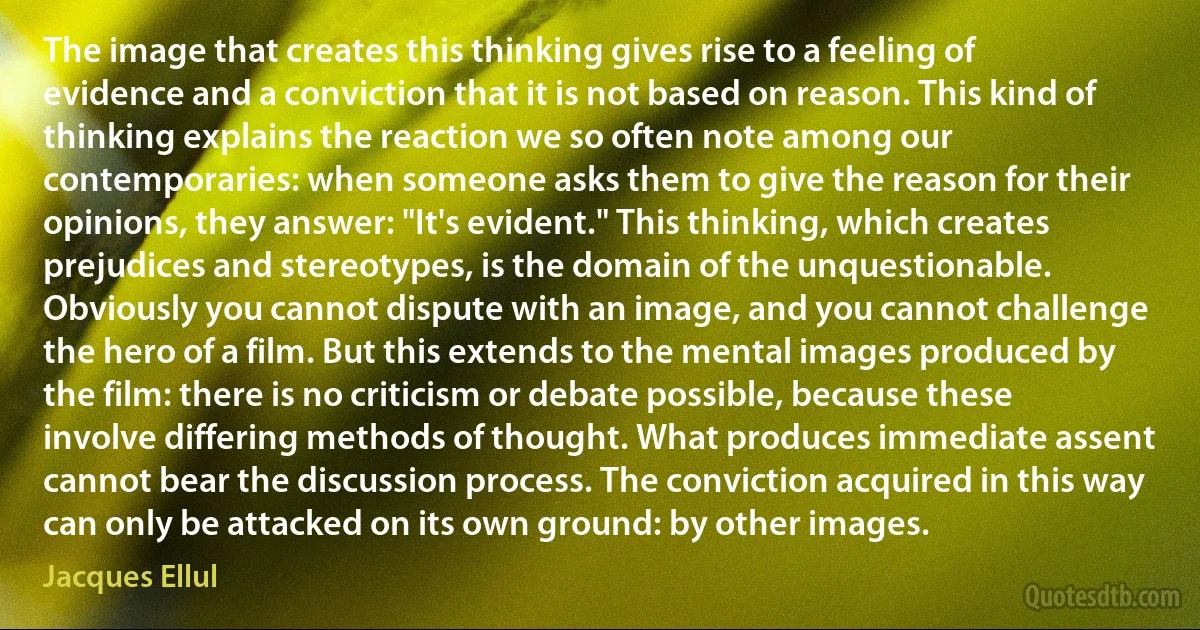
The image that creates this thinking gives rise to a feeling of evidence and a conviction that it is not based on reason. This kind of thinking explains the reaction we so often note among our contemporaries: when someone asks them to give the reason for their opinions, they answer: "It's evident." This thinking, which creates prejudices and stereotypes, is the domain of the unquestionable. Obviously you cannot dispute with an image, and you cannot challenge the hero of a film. But this extends to the mental images produced by the film: there is no criticism or debate possible, because these involve differing methods of thought. What produces immediate assent cannot bear the discussion process. The conviction acquired in this way can only be attacked on its own ground: by other images.
Jacques EllulRelated topics
answer bear contemporaries criticism debate film gives ground hero kind note possible reaction reason rise thought thinking way someoneRelated quotes
People talk about nightfall, or night falling, or dusk falling, and it's never seemed right to me. Perhaps they once meant befalling. As in night befalls. As in night happens. Perhaps they, whoever they were, thought of a falling sun. That might be it, except that that ought to give us dayfall. Day fell on Rupert the Bear. And we know, if we've ever read a book, that day doesn't fall or rise. It breaks. In books, day breaks, and night falls.
In life, night rises from the ground. The day hangs on for as long as it can, bright and eager, absolutely and positively the last guest to leave the party, while the ground darkens, oozing night around your ankles, swallowing for ever that dropped contact lens, making you miss that low catch in the gully on the last ball of the last over.

Hugh Laurie
The animals themselves are incapable of demanding their own liberation, or of protesting against their condition with votes, demonstrations, or boycotts. Human beings have the power to continue to oppress other species forever, or until we make this planet unsuitable for living beings. Will our tyranny continue, proving that morality counts for nothing when it clashes with selfinterest, as the most cynical of poets and philosophers have always said? Or will we rise to the challenge and prove our capacity for genuine altruism by ending our ruthless exploitation of the species in our power, not because we are forced to do so by rebels or terrorists, but because we recognize that our position is morally indefensible? The way in which we answer this question depends on the way in which each one of us, individually, answers it.

Peter Singer
It should be clear by now that there are people who can, in fact, be reasonably considered experts; that it is rational to rely, within limits, on ex pert opinion; and that it is possible, by exercising relatively simple criteria, to gain insight into whether a particular expert is reliable or not. It is also true that experts, of course, do make mistakes, and that even the agreement of a large majority of experts in a field does not guarantee that they got it right. That's the nature of scientific truth, as we have seen throughout this book: it is tentative, because it is the result of a human endeavor that is limited both by the type and amount of available evidence and by humans' finite mental powers and emotional reactions. But the examples above show how you can, with a little bit of practice, tell science from bunk!

Massimo Pigliucci
We've already said that it's the Holy Spirit who gives us the ultimate assurance of Christianity's truth. Therefore, the only role left for argument and evidence to play is a subsidiary role. I think Martin Luther correctly distinguished between what he called the magisterial and ministerial uses of reason. The magisterial use of reason occurs when reason stands over and above the gospel like a magistrate and judges it on the basis of argument and evidence. The ministerial use of reason occurs when reason submits to and serves the gospel... Should a conflict arise between the witness of the Holy Spirit to the fundamental truth of the Christian faith and beliefs based on argument and evidence, then it is the former which must take precedence over the latter, not vice versa.

William Lane Craig
Experience also shows that to be effective, we must adopt a model of partnership, not paternalism. This approach is based on our conviction that people in the developing world have the capacity to improve their own lives, and will rise to meet high expectations if we set them. America has sought to apply this model in our Emergency Plan for AIDS Relief. Every nation that receives American support through this initiative develops its own plan for fighting HIV/AIDS and measures the results. And so far, these results are inspiring. Five years ago, 50,000 people in sub-Sahara Africa were receiving treatment for HIV/AIDS. Today, that number is nearly 1.7 million. We're taking a similar approach to fighting malaria, and so far, we've supported local efforts to protect more than 25 million Africans.

George W. Bush
